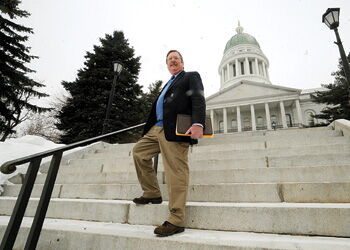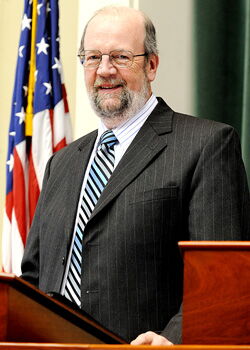Fresh start | New GOP control in Augusta raises hopes for Maine's business advocates
Ever since the Republican election sweep on Nov. 2, expectations have been building among business leaders that Maine’s new governor and Legislature will not only share their agenda, but will focus on it throughout their time in office.
Gov. Paul LePage did nothing to dampen such expectations with his inaugural address, in which he declared, “Profit is not a dirty word. In fact, it is the direct and indirect solution to all of our challenges.”
Interviews with officials at Maine’s four largest chambers of commerce and the new legislative leadership confirm that business and state government begin the year largely on the same page — but with differing points of emphasis and strategy that could significantly shape legislation and the state budget in the months ahead.
It’s been 44 years — the end of the John Reed administration in 1966 — since Republicans controlled both houses of the Legislature and the governor’s office simultaneously. Chris Hall, a veteran of 21 years lobbying at the State House for the Maine State Chamber and now the Portland Regional Chamber, says this represents a huge opportunity for business to reshape state government.
But he also issues a cautionary note. “The priority for our members is that whatever is done in Augusta, it needs to increase the number of private sector jobs and increase household incomes,” he says. All the rest, “cutting regulations, lowering taxes, shrinking state government,” Hall says, “will be seen as a failure if we don’t get to those two goals.”
Indeed, the prospect of shrinking state government and cutting programs that rapidly expanded under the Baldacci administration, including Medicaid and, for a time, state aid to education, carry risks, he acknowledges. State money for education and health care has been important to sustaining rural communities with shrinking job bases, and Hall says it’s important to deliver on promises of job creation. Yet he’s confident the new formula will work.
“For the first time, there’s a willingness to take on some of the thinking that’s dominated Maine politics for decades,” he says. “It’s been brought into question whether spending more money is better for the state, and that it’s always helpful to bring in more federal funds to expand programs.” His talks with legislative leaders have shown him that, “These aren’t people who are interested in more across-the-board cuts. They want to cut vertically, to see what programs are less essential and what we can do without.”
Business leaders from Portland, Augusta, Lewiston and Bangor seem to agree that the agenda items of most consequence to business center around now-familiar topics: the high costs of energy and health care, and what they see as overzealous regulation and high taxes.
Everyone wants to talk about LD 1, “An Act to Ensure Regulatory Fairness and Reform,” the joint initiative between Senate President Kevin Raye and House Speaker Robert Nutting that’s the primary task of the Joint Select Committee on Regulatory Reform.
During the campaign, charges over lack of consistent regulation by state agencies were commonplace in GOP campaigns, and the assertions are now being fleshed out, both in public hearings around the state by the regulatory reform committee and LePage’s Red Tape Audits in 20 different locations.
To Nutting, it’s the myriad of permits needed to do something as simple as open a restaurant or a retail food business that needs changing. “There are four different permits just for alcohol sales, and there are seafood permits and meat permits, and there are others,” he says.
Given the need for expertise in food inspections, one-stop shopping may not be possible, but Senate President Raye says, “We ought to at least be able to streamline the process and make the regulations consistent.”
Dan Demeritt, the governor’s spokesman, said news reports that the Department of Environmental Protection has issued $5 billion in permits over the last eight years and turned down just six projects a year misses the point.
“What they don’t say is how many applications were not even made because of the length and complexity of the process,” he says. “Most businesses have to hire a consultant to represent themselves before DEP. It can be an intimidating process.”
While the Legislature can rewrite the rules, business leaders agree many of their concerns stem from the way state agencies are managed. “We really have seen a hostile attitude on the part of regulators, and a lack of cooperation,” says Dana Connors, president of the Maine State Chamber in Augusta. While the number of appointments directly filled by the governor is limited, Connors says a change in attitude is possible throughout state government. “In fact, it’s already happening, because the message is so clear and consistent,” he says.
“The length of time and the expense of dealing with the bureaucracy does cost jobs,” Raye says. “It takes small business people, in particular, away from their core mission of providing a service or manufacturing a product.”
Gearing up for change
The chambers are taking different approaches to the session. Some have produced lengthy lists of legislative priorities, while others seek more to influence what happens around the State House, particularly in crafting a budget that will need to bridge an $800 million “structural gap,” and provide at least what Nutting calls a “down payment” on tax relief.
John Porter, president of the Bangor Region Chamber of Commerce, who’s been on the job a year, says he plans to visit Augusta more often.
“We have a full slate of issues, with tax relief at the very top,” Porter says. Bangor, like the other large chambers, ended up supporting the tax reform package enacted by Democrats in 2009 but repealed by voters the following year in a GOP-led campaign. The state chamber opposed the measure.
Porter says his group would like to see a new version of tax reform that focuses on tax reduction, but also restructures the tax code to make it less volatile. “Just because we haven’t reached consensus on the issue doesn’t mean it isn’t still a pressing problem,” he says.
Raye says reducing the income tax will probably be the sole objective of GOP-backed legislation this year. While he’s heard the argument that the state’s narrow sales tax base is a problem, he doesn’t think it’s worth reopening the debate after last session’s “overreaching” by Democrats. “Even states with broader bases are seeing volatility,” he says, “and some of them are worse off than Maine.”
On energy supply and costs, there is a plethora of views and, so far, not much common ground.
Hall says the biggest opportunities are in greater efficiencies by businesses, which he calls “still an untapped source of savings” for many companies.
Porter thinks Maine needs to be alert to new sources of supply, such as natural gas derived from shale deposits, which may make gas exporters of such relatively nearby states as New York and Pennsylvania.
Raye doesn’t see a lot of short-term fixes on the horizon, but says it’s important to keep Maine ahead of the curve as alternative sources such as wind and tidal power come down in price and fossil fuel prices continue to rise. “At the point those lines cross, there will be profound changes,” he says. And unlike LePage, who has expressed skepticism about the financial viability of land-based wind power, he supports it both on and offshore. He’s also pitching the last remaining liquefied natural gas project with an application currently under consideration on Cobscook Bay, which lies in his district, and says he hopes it “will come to fruition soon.”
Porter says the Bangor Chamber sets a high priority on developing a new cargo port at Searsport, a proposed $200 million, multi-year buildout that found no takers during the Baldacci years. “An administration that makes this a priority, that uses our competitive advantages of location, deep water and double-stack rail service can make it happen,” he says.
Health care costs are punishing small business owners and their employees, chamber leaders agree, but solutions break down between short-term insurance reforms and longer-term changes in wellness and lifestyle.
Chip Morrison, president of the Androscoggin County Chamber, is a big believer that Maine’s private insurance market is over-regulated and would quickly produce more competition and lower rates with fewer mandates and restrictions.
“Look at New Hampshire. It’s the same kind of population, and rates are much, much lower,” he says.
A bipartisan commission has just filed a unanimous report calling for Maine to set up its own insurance exchange under the federal Affordable Care Act, and eventually try to partner with other New England states in a regional exchange.
Nutting says he thinks the ACA “will be implemented as planned,” but “it’s a long time until 2014,” when the exchange provisions take hold.
Raye expects legislation to permit Maine residents to purchase insurance out of state will pass this session. While there will be no consumer protections for policies regulated by other states, “People may decide they don’t need all that coverage and are willing to take more responsibility themselves.”
Hall is among those skeptical of how much insurance reform can produce, and says wellness relates to health care costs in much the same way safety did to successful workers’ compensation reforms in the 1990s.
“We have to change the culture that says if you get sick from preventable causes, it’s someone else’s responsibility to make you well,” he says. “Business took the lead before, and we believe business will have to do that on health care costs as well.”
Doug Rooks, a writer based in West Gardiner, can be reached at editorial@mainebiz.biz.












Comments